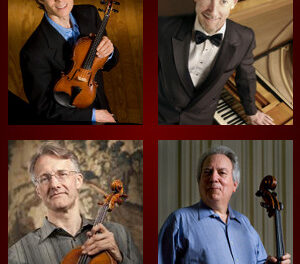The Young Artists Orchestra, a student ensemble under the direction of resident conductor José-Luis Novo, provided a thrilling and lively night of music in Dana Auditorium on the Guilford College campus, home of the Eastern Music Festival. The star of the evening, however, was Jeffrey Multer, concertmaster of the Eastern Festival Orchestra and alum of EMF, playing Mendelssohn’s magnificent Violin Concerto in E minor, a three-movement masterpiece overflowing with both lyricism and passion.
From the opening notes of the violin solo, Multer took control of the proceedings and made clear that the performance was to be an impassioned one. Indeed, after his initial entry with the orchestra, he continued to play right along with the orchestra, even though most soloists take a break during this passage. He seemed to delight in making music, often smiling and urging the concertmistress, Jennifer Gersten, to join in with his depth of feeling.
The second movement is a melodious Andante, and Multer gently pled with the rest of the orchestra to join in this tender character, a challenge the YAO took up earnestly. The finale is a sprightly affair that flies — in fact it seemed as though Multer would have liked to have flown a bit faster than the orchestra, creating some issues of ensemble.
Multer’s passionate playing was balanced by an incredible lyricism, impeccable intonation, and great music sense. Throughout the concerto Maestro Novo admirably kept the forces together. His elastic style of direction is well suited for the elegance and nuances inherent in the score.
The concert began with a winner — Mozart’s Overture to Cosi fan tutte. I love the way this composer’s musical introductions serve equally well as preludes to his operas and as openers to a fine evening of music. Maestro Novo’s fast tempos were brisk, and the hurry-scurry nature of the score was never derailed. The mood for the evening was perfectly set.
The Eastern Music Festival, as an educational institution, does not shy away from putting difficult music in front of the students, and this was certainly proven as the young musicians took on Rimsky-Korsakov’s Scheherazade, a four-movement symphony based on “The Thousand and One Nights.” This is a marvelously colorful score and features solo passages for just about every section in the orchestra: violin, cello, harp, oboe, bassoon, flute, clarinet, horn, trumpet, and the list goes on. The strength of the orchestra is only as good as each of these individual musicians, and the YAO certainly proved its mettle.
That being said, it is a student orchestra. Which means that some of the ensemble was not entirely perfect. The wind section, for example, should sound as a unit when it enters; that was not always the case Friday night.
The music is decidedly “oriental” in sound (according to the composer’s own notes), with many passages that evoke Arabia. The movements conjure up vivid images: “The Sea and Sinbad’s Ship,” “The Story of Kalender Prince,” “The Young Prince and the Young Princess,” and “Festival at Baghdad; The Sea; Shipwreck; Conclusion,” and the orchestra did a great job conveying this powerfully descriptive piece.
Much credit for the success of the performance is due to Novo’s superb direction; the conductor’s style changed character like a chameleon as the music moved quickly through various moods, and the orchestra responded with rapt attention and intensity.
The powerful brass playing was important — the section’s combined sound was full and strong. The numerous percussionists enlivened the proceedings considerably as well. But special kudos need to go to concertmistress Jennifer Gersten, whose solo playing (representing the title character throughout) was exquisitely expressive, and Angelica Hairston, whose evocative harp added immensely to the overall effect.











